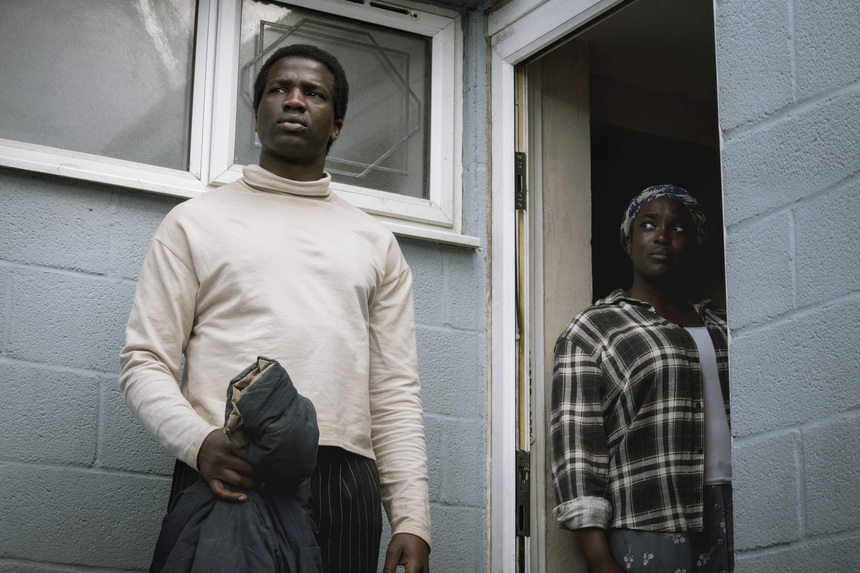Review: HIS HOUSE, The Demons We Find, the Demons We Bring

Likely most of us have seen the harrowing footage of people making the perilous journey in tiny, run-down boats across the Mediterranean Sea, to reach the hoped-for safety of Europe (as they do crossing Central America to the USA, on foot). So much of the violence and war occuring in Africa and other countries is a direct or indirect result of centuries of colonial oppression, so the ill-treatment of these refugees is awful, to put it very mildly. Even if they manage to reach 'friendly' shores live (many do not), they are treated with disdain, rather than the welcome they should expect (given that refugees and immigrants contribute far more to their adopted countries than they take).
Remi Weekes' feature debut His House is a haunting and harrowing story of two such refugees, who arrive in the UK with secrets of their own, and ghosts that have determined to follow them and make their presence known in a house that is well-suited to their arrival. Moving between horror and social realism, the film resonates the walls in which it lives with a potency and immediacy of the refugee experience that will shake you to the core.
Wunmi Mosaku (Lovecraft Country) and Ṣọpẹ Dìrísù (Gangs of London) are Rial and Bol, who have escaped war-torn South Sudan, making the terrifying journey to the UK. Losing their only daughter has weighed upon them, but they are finally granted refugee status. They're given a place to live while they await advancement of their status, but a paltry £75/week to survive, are forbidden to work, forbidden to have guests or friends to their home; in other words, still almost completely isolated. And this house that they're given, which their case worker Mark (Matt Smith, Doctor Who) calls a palace, is barely habitable, with broken doors, holes in the walls, and the front yard a dumping ground.
Their next-door neighbour merely smokes and stares out the window at Rial and Bol; Bol finds some kind people who give him a care package and invite him to join in watching a football match; while Rial discovers that there isn't necessarily kinship in race, she is still the outsider. Bol is sadness, while Rial is anger, and whatever is in the house is feeding on it. But was it there before - feeding on all the people who have passed through, likely others forced into a kind of destitute limbo, unable andn unallowed to better themselves until given 'permission'? Or is it something that has followed the couple in their sorrow and guilt?
Bol desperately wants to remain optimistic and become part of the community, to completely forget what happened to them up to this point. Rial is far more realistic, and pessimistic, and starts making moves towards going home (even that reality is someone not worse than what they are experiencing). Whatever it is that is living in the walls, there is no denying its presence. It makes itself known early and clearly, and turning on the lights will only delay the inevitable.
Much like Under the Shadow, Weekes has no problem connecting the socio-political with the personal and domestic. When a house is temporary, it's hard to muster the energy to make it a home, especially without the proper means. When the inhabiting ghosts and monsters, it turns out, are ones that you brought with you, no house will be a home unless the ghosts are confronted. Weekes and production designer Jacqueline Abrahams gives us a house that is not only dilapetated on its own, but feeds on the fear and trauma of its current in habitants. Coupled with cinematographer Jo Willems, and these ghosts are visceral, they grab your hands and eyes and they will not let go until you awknowledge your demons.
The outside has its dangers too, from government officials who fully expect the couple to be the 'model immigrants' yet do not give them the means to do so, and the maze of the housing estate, with children who all look the same and will not give Rial even the slightest word of kindness. As Bol's stability begins to buckle and he literally starts tearing the house apart, just what those demons are provides an unexpected insight into the fracturing of this once strong couple's relationship. There is a price to be paid for what they've done, and whatever is lurking in the house has come to collect.
Leaning into its the mythology of its Sudanese characters, coupled with some UK haunted-house tropes, the plight of the refugee, and the strains of trauma on the individual and the couple, His House is an intimate and quietly terrifying film, one whose monsters are wholly believable and understood as much as its humans.
His House debuts October 30th on Netflix.







